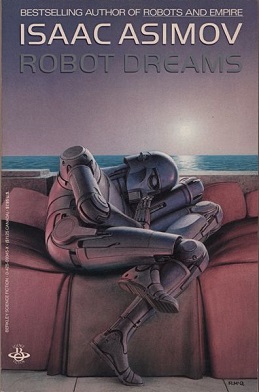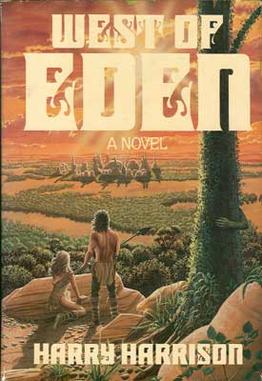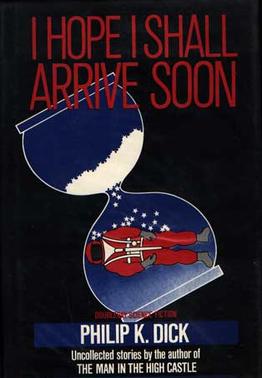
Gene Rodman Wolfe was an American science fiction and fantasy writer. He was noted for his dense, allusive prose as well as the strong influence of his Catholic faith. He was a prolific short story writer and novelist, and won many literary awards. Wolfe has been called "the Melville of science fiction", and was honored as a Grand Master by the Science Fiction and Fantasy Writers of America.

Robot Dreams (1986) is a collection of science fiction short stories by American writer Isaac Asimov, illustrated by Ralph McQuarrie. The title story is about Susan Calvin's discovery of a robot with rather disturbing dreams. It was written specifically for this volume and inspired by the McQuarrie cover illustration. All of the other stories had previously appeared in various other Asimov collections. Four of the stories are robot stories, while five are Multivac stories.

West of Eden is a 1984 science fiction novel by American writer Harry Harrison.

Asimov on Science Fiction (ISBN 0-586-05840-0) is a 1981 non-fiction work by American writer and scientist Isaac Asimov. It is a collection of short essays dealing with various aspects of science fiction. Many of the essays are editorials from Isaac Asimov's Science Fiction Magazine.
Orbit was a series of anthologies of new science fiction edited by Damon Knight, often featuring work by such writers as Gene Wolfe, Joanna Russ, R. A. Lafferty, and Kate Wilhelm. The anthologies tended toward the avant-garde edge of science fiction, but by no means exclusively; occasionally the volumes featured nonfiction critical writing or humorous anecdotes by Knight. Inspired by Frederik Pohl's Star Science Fiction series, and in its turn an influence on other original speculative fiction anthologies, it ran for over a decade and twenty-one volumes, not including a 1975 "Best of" collection selected from the first ten volumes.

The Best Science Fiction of Isaac Asimov, published in 1986, is a collection of 28 short stories by American writer Isaac Asimov, personally selected as favorites by himself.

The Castle of the Otter is a collection of essays and other non-fiction by Gene Wolfe, related to his Book of the New Sun tetralogy. It takes its title from an incorrect announcement of Wolfe's final volume in Locus. The Citadel of the Autarch was the actual name of the final work in the series. Wolfe liked the inaccurate title, though, and reused it as the name for a companion work of non-fiction essays and unused materials from the series.

Bones of the Moon is a novel by American writer Jonathan Carroll, depicting the real and dream life of a young woman. Like many of Carroll's works, it straddles the horror and fantasy genres.

The Alternate Asimovs (1986) is a collection of early science fiction drafts by American writer Isaac Asimov. Asimov mostly threw away early drafts. Just a few survived and were included in this anthology.

The Urth of the New Sun is a 1987 science fiction novel by Gene Wolfe that serves as a coda to his four-volume Book of the New Sun series. Like Book of the New Sun, it is of the Dying Earth subgenre. It was nominated for the Hugo Award for Best Novel, Locus Award for Best Science Fiction Novel and the Nebula Award for Best Novel in 1988.

Software is a 1982 cyberpunk science fiction novel written by Rudy Rucker. It won the first Philip K. Dick Award in 1983. The novel is the first book in Rucker's Ware Tetralogy, and was followed by a sequel, Wetware, in 1988.

I Hope I Shall Arrive Soon is a book by American writer Philip K. Dick, a collection of 10 science fiction short stories and one essay. It was first published by Doubleday in 1985 and was edited by Mark Hurst and Paul Williams. Many of the stories had originally appeared in the magazines Fantasy and Science Fiction, Worlds of Tomorrow, Amazing Stories, Interzone, Rolling Stone College Papers, The Yuba City High Times, Omni and Playboy.

The Sun Shines Bright is a collection of seventeen nonfiction science essays by American writer and scientist Isaac Asimov. It was the fifteenth of a series of books collecting essays from The Magazine of Fantasy and Science Fiction. It was first published by Doubleday & Company in 1981.

Science Fiction: The 100 Best Novels, An English-Language Selection, 1949–1984 is a nonfiction book by David Pringle, published by Xanadu in 1985 with a foreword by Michael Moorcock. Primarily, the book comprises 100 short essays on the selected works, covered in order of publication, without any ranking. It is considered an important critical summary of the science fiction field.

Free Live Free is a novel by American writer Gene Wolfe, first published in 1984.
This is a list of works by Gene Wolfe, an American author of science fiction and fantasy, with a career spanning six decades.
"How I Lost the Second World War and Helped Turn Back the German Invasion" is an alternate history short story by American writer Gene Wolfe. It was first published in Analog Science Fiction and Fact in May 1973, and has since been republished in The Best of Analog (1978), in Gene Wolfe's Book of Days (1981), in Castle of Days (1992), in Roads Not Taken: Tales of Alternate History (1998), and in Knights of Madness (1998).

Nebula Awards Showcase 2014 is an anthology of science fiction short works edited by Kij Johnson. It was first published in trade paperback by Pyr in May 2014.
Anatomy of Wonder — A Critical Guide to Science Fiction is a reference book by Neil Barron. It covers hundreds of works of science fiction.
Castles is a book by David Day, David Larkin, and Alan Lee published in 1984.















